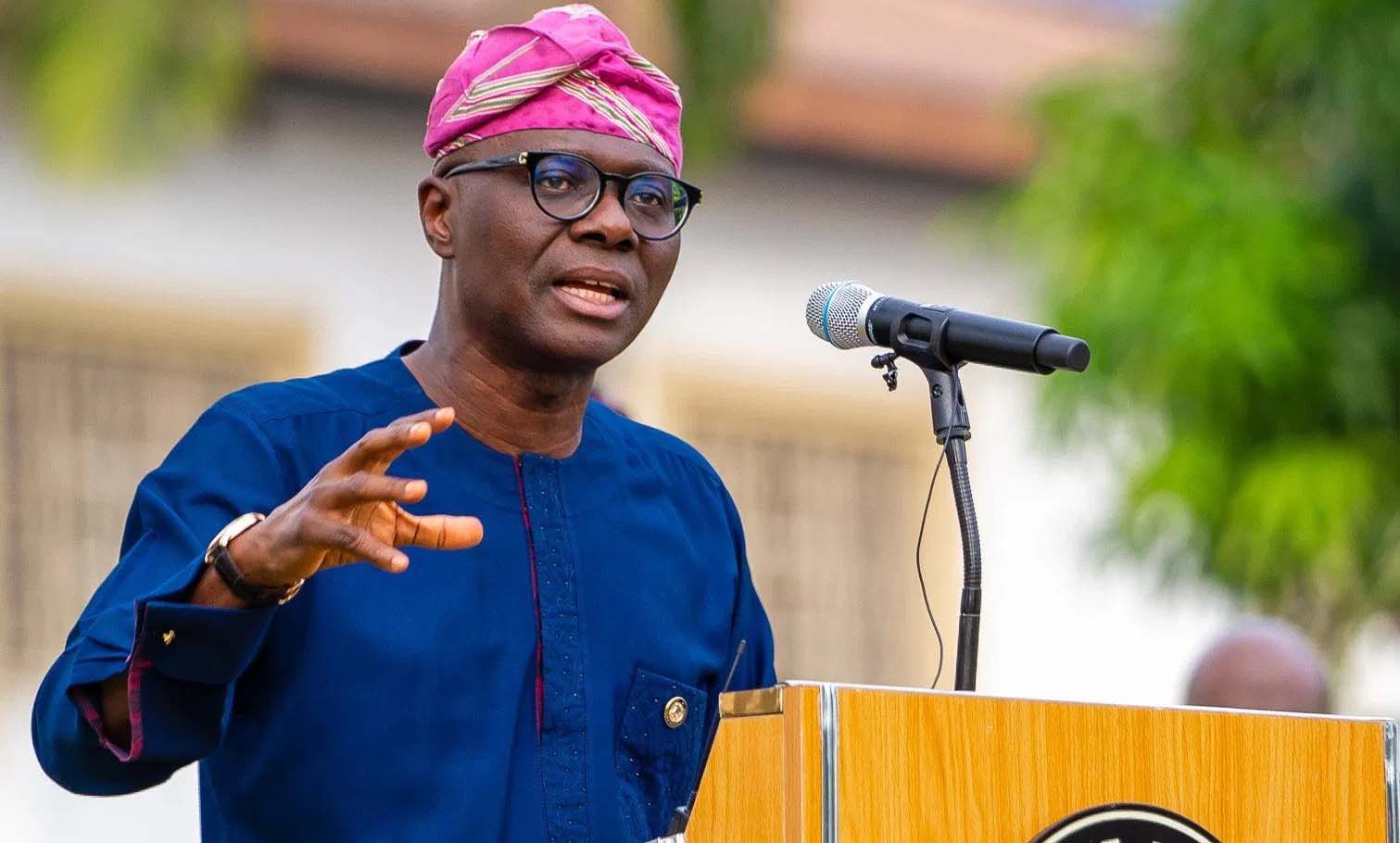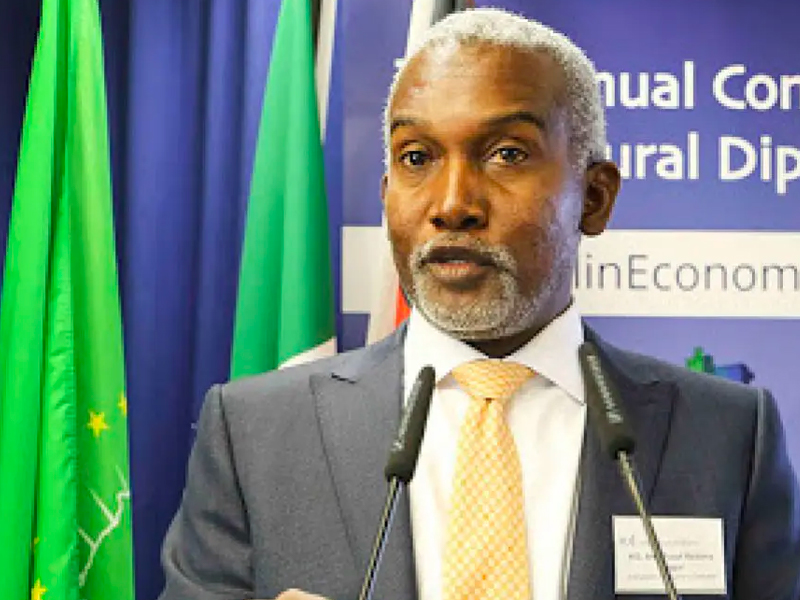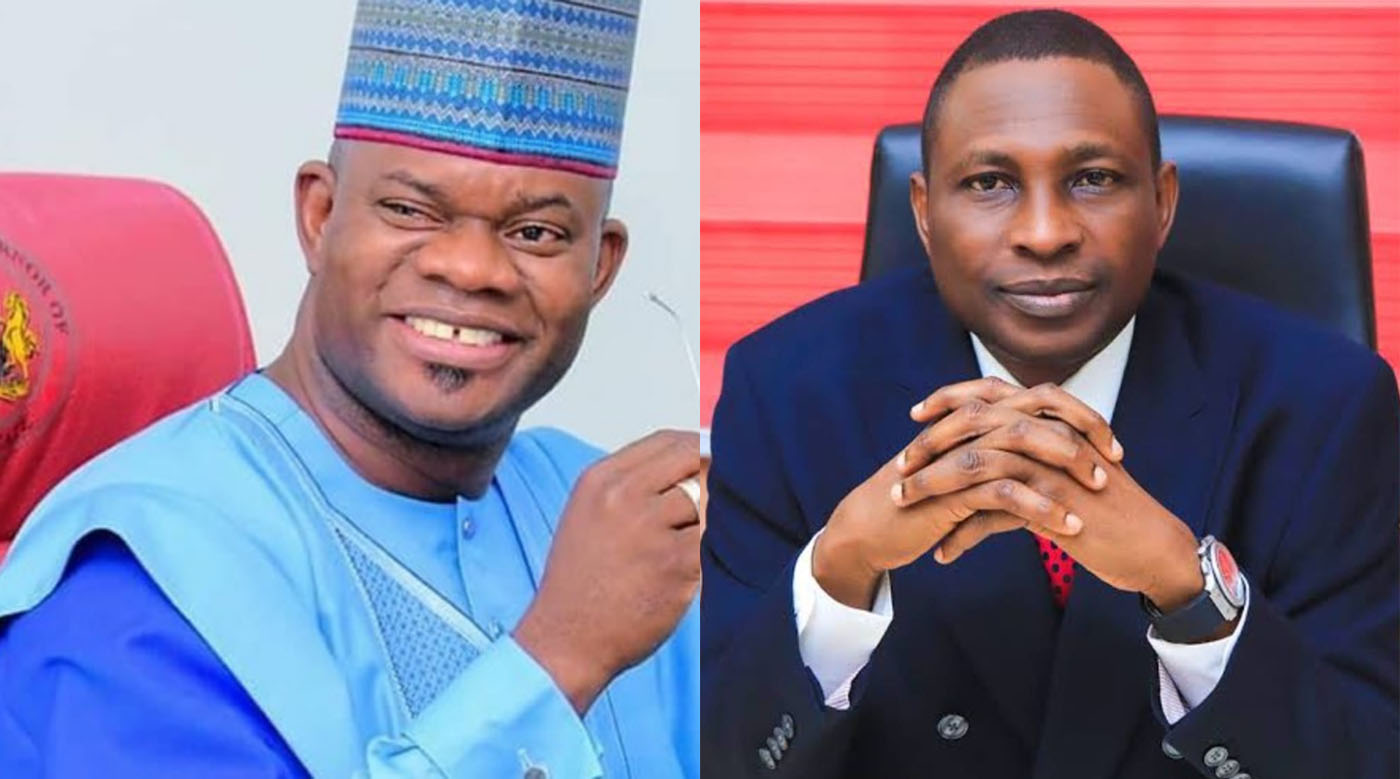News
Special status: Lagos seeks one percent Consolidated Revenue Fund allocation

Should Lagos State’s demand for special status, being Nigeria’s business hub, sailed through, it will get one per cent allocation from the federation account.
Justifying its special status demand, Governor Babajide Sanwo-Olu said the state has multiplying effects on the Southwest region and the country.
The governor made the request at the opening of a two-day Southwest zonal public hearing on the review of revenue allocation formula organised by the Revenue Mobilisation Allocation and Fiscal Commission (RMAFC) at Lagos Continental Hotel, Victoria Island.
According to Sanwo-Olu, the revenue sharing formula should be 34 per cent for Federal Government, including one perc ent for Federal Capital Territory (FCT); 42 per cent for states; 23 per cent for local government areas and one per cent for Lagos State (Special Status).
He said the proposal should replace the prevailing revenue allocation formula of 52.68 per cent (Federal Government), 26.72 per cent (36 state governments) and 20.60 per cent (774 local government areas).
In a memorandum on the Review of Revenue Allocation Formula he submitted to the RMAFC, Sanwo-Olu declared that “allocating one per cent (Special Status) for the state and allowing the three tiers of government to share 99 per cent in a new revenue sharing formula is very straightforward, self-justifying and in no way controversial”.
The governor argued the review of the revenue allocation formula was long overdue, stating the best way to guarantee national progress and development is by paying attention to sub-national development because the national is a summation and a reflection of the sub-national.
Besides, Sanwo-Olu said the call for special status was recognition of its huge financial commitments to infrastructure and provision of basic amenities for the increasing population of its residents, as well as its preeminent contribution to the national coffers.
He said the call, which has been re-echoed at different fora and at various levels and tiers of government, cannot be over emphasised, especially against the backdrop of the current economic situation of the country, the aftermath of the last year’s #EndSARS protests and the devastating effects of the COVID-19 pandemic, for which Lagos has been the national epicenter.
He said: “Our demand is a sharing formula that is just, fair and equitable; reflecting the contribution of stakeholders to the common purse; and also one that enhances the capacity of state and local governments to deliver high-quality services and the full dividends of democracy to the greatest number of our people.
“Lagos State is no doubt the nation’s commercial capital, and population center. The level of funding required to service the State’s social and public infrastructure is so significant that it will be difficult for the State to bear the burden for much longer under the present arrangement.
“I should say that it will actually be unfair to expect the state to bear this heavy burden on its own. It is therefore necessary to give due consideration to all the variables that support our advocacy for a special status.
“The call for a special status for Lagos is not a selfish proposition; it is in the best interest of the country and all Nigerians, for Lagos which accounts for about 20 per cent of the national GDP and about 10 per cent of the nation’s population to continue to prosper.
“Lagos is more than just another state in the Nigerian federation. There is no tribe in the country that has no significant stake in Lagos State.
”As the former capital of the country for 77 years (compared to the 30 years that Abuja has been the Federal Capital Territory), Nigeria’s largest metropolis still bears the heavy brunt of being home to all Nigerians; irrespective of age, class, gender, religious affiliation or tribe.
“There are several statistics that shows the number of people that comes into Lagos every day, however, there are clear indications that most of these people migrate with the intention to make Lagos their new home and in pursuit of personal dreams due to the opportunities the city-state seemingly possesses, and this portends additional responsibilities on the government.
“Additionally, Lagos still harbors a huge number of federal establishments which could not be moved to Abuja.
“These include military cantonments and barracks, police, customs, immigration, civil defence, prisons, road safety and security/intelligence establishments.
“There are several reasons to justify the call for a special status for Lagos apart from the aforementioned factors, and by extension, a review of the revenue allocation sharing formula.”
Governor Sanwo-Olu also said that it would be unfair to leave the state to bear the burden of the massive destruction it experienced by the State during the #EndSARS protests hijacked by hoodlums and the COVID-19 pandemic without assistance from the centre.
“This month marks one year after the massive destruction experienced by the State in the violence that accompanied the hijacking of the EndSARS protests. Public buildings were burnt down, and historical infrastructure destroyed.
“Although we have put that experience behind us and forged ahead, the reality of this unfortunate incident remains with us; resources that should be committed to other areas of need are now being used for the restoration of these public facilities. It will be totally unfair for Lagos State to be left alone to bear these huge expenses without assistance from the centre.
“COVID-19 pandemic is another issue that has once again, supported the justification for Lagos to be accorded the privilege of a special status. As much as this affects the entire country, it is a fact that the degree of havoc caused by this virus differs from state to state.
“Lagos was the epicentre for this virus, the same way it was for the Ebola virus some years ago. The management of these unforeseen occurrences comes with huge responsibilities and financial commitments on the part of the state government.”
The governor commended the Chairman and members of RMAFC for taking a bold step, which he believed will “result in a fundamental alteration of the current revenue sharing formula, in favour of one that is truly fair and equitable, and that takes into full consideration the specific and more pragmatic fiscal contexts of the sub-national governments of the federation.”
RMAFC chairman Elias Mbam said a review of revenue allocation formula was necessary for fairness, equity, justice.
He said that the commission had started the process of reviewing the subsisting vertical revenue allocation formula in line with changing realities.
Mbia said: “The last review of the revenue allocation formula was in 1992. Since then, a lot of socio-economic changes have occurred, hence, necessitated the need for a review to reflect changing realities.
“RMAFC by virtue of paragraph 32(b) ,part 1 of the third schedule to the 1999 constitution of the Federal Republic of Nigeria (as amended) is empowered ‘ to review from time to time the revenue allocation formula and principles in operation.
“This is to ensure conformity with changing realities, provided that any revenue formula which had been accepted by an Act of the National Assembly shall remain in force for a period of not less than five years from the date of commencement of the Act.”
He said the commission had called for memoranda from stakeholders, including Civil Society Organisations (CSO’s), academia and the general public.
The RMAFC boss lauded Sanwo-Olu for accepting to host the hearing and commended the governors of Ogun , Osun , Oyo, Ondo and Ekiti for their active participation.
The Nation
News
Under-pressure AIG Okolo says state police comment personal opinion, not IGP’s

Under-pressure AIG Okolo says state police comment personal opinion, not IGP’s
Inspector-General of Police in charge of Information, Communications and Technology (ICT) at the Force Headquarters, Benjamin Okolo, may have been under pressure for saying Nigeria is not ripe for state police.
Since he represented the Inspector General of Police, Kayode Egbetokun, at a forum on Monday with former Nigeria’s presidents and leaders of thoughts, the statement was simply attributed to the IGP.
It was at a national dialogue on state police organised by the House of Representatives in Abuja.
Okolo however on Tuesday retracted the comment, saying he was not directed by IGP Egbetokun to disagree with the position of former Head of State, Gen. Abdulsalam Abubakar, and the former President, Goodluck Jonathan, on the issue of state police at the forum.
Okolo had also proposed that the Nigeria Security and Civil Defence Corps (NSCDC) and the Federal Road Safety Corps (FRSC) be merged to become a department under the police.
Newstrends had quoted Okolo as saying at the Monday forum, “It is the submission of the leadership of the Nigeria police force that Nigeria is yet to mature and ready for the establishment of state-controlled police.
“In view of this, the police leadership rather is recommending the following instead of creating state police.
“First, the Nigeria Security and Civil Defence Corps, Federal Road Safety to form a department under the Nigeria police.”
But in a U-turn, Okolo, at a press briefing at the Force Headquarters, Abuja on Tuesday, said he only made the comment in his personal capacity to stimulate the discourse, and not the official position of the IGP and the police force.
He said, “My expressions on state police at the session held at Abuja Continental Hotel on 22nd April, 2024 are my personal opinion to stimulate the discourse.
“They are not the views of the Inspector-General of Police or the Nigeria Police Force.”
News
Shun politicking, FG tells new 17 Chargé D’affaires, Consuls General

Shun politicking, FG tells new 17 Chargé D’affaires, Consuls General
The Federal Government has advised newly appointed five new Chargé D’affaires and 12 Consuls General to the nation’s mission in other countries to shun politicking and focus strictly on their job.
Minister of Foreign Affairs, Ambassador Yusuf Tuggar, gave the charge while unveiling the new appointees on Tuesday.
He also charged them to be good ambassadors of Nigeria.
A statement by Alkasim Abdulkadir, the minister’s Special Assistant on Media and Communications Strategy, gave these details.
While asserting that they were pivotal to the economic drive of President Bola Ahmed Tinubu, Tuggar further stressed that as seasoned career diplomats, they should recommit themselves to their calling of diplomacy for the collective interest and development of Nigeria.
Reacting on behalf of the new appointees, the just appointed Consul General for the Consulate in New York, Ambassador Abubakar Jidda, reiterated the commitment of his colleagues to uphold the ethos of the profession and pledged to bring the much-needed investments to the country.
He thanked President Bola Tinubu and the leadership of the Ministry of Foreign Affairs for the confidence reposed in them.
The new appointees are to resume immediately, the statement added.
FULL LIST:
Chargé D’affaires
Amb. Saidu Mohammed DODO, Damascus, Syria
Amb. Patrick Imoudu, IMOLOGHOME Pyongyang, Democratic Peoples’ Republic of Korea
Amb. Francisca Kemi OMAYULI
Singapore, Singapore
Amb. Babagana AHMADU
Bangui, Central African Republic
Amb. Mohammed MOHAMMED
Tripoli, Libya.
Consul General Conuslate
Amb. Auwalu Jega NAMADINA
Atlanta, USA
Amb. Nnamdi Okechukwu NZE
Bata, Equatorial Guinea
Amb. Francis Ntui ENYA
Douala, Cameroon
Amb. Gbadebo AFOLABI
Shanghai, China
Amb. Oludare Ezekiel FOLOWOSELE
Hong Kong, China
Amb. Abubakar JIDDA
New York, USA
Amb. Yakubu Audu DADU
Frankfurt, Germany
Amb. Taofik Obasanjo Coker
Buea, Cameroon
Amb. George Collins ONWUEKWE
Guangzhou, China
Amb. Umar Ibrahim BASHIR
Johannesburg, South Africa
Amb. Zayyan IBRAHIM
Dubai, UAE
Amb. Muazam Ibrahim Jibrin NAYAYA
Jeddah, Saudi Arabia
News
Produce copy of invitation to me, Bello challenges EFCC

Produce copy of invitation to me, Bello challenges EFCC
The former governor of Kogi State, Yahaya Bello, refuted allegations that he disregarded an invitation from the Economic and Financial Crimes Commission (EFCC).
According to the EFCC, Bello was summoned for interrogation on January 27 this year but failed to appear, leading to a declaration of him as a fugitive after an unsuccessful attempt to apprehend him at his Abuja residence.
In response to this claim, Bello’s media office issued a statement on Tuesday, challenging the accusations and urging the anti-graft agency to produce a copy of the invitation letter.
READ ALSO:
- Ronaldo playing in Saudi league for money like me – Ighalo
- Passengers overpower bandits in Zamfara
- Emefiele spent N18.9bn to print N684.5m notes, says EFCC
The statement read, “Our attention has been drawn to a publication/press statement with the above title, issued by the Economic and Financial Crimes Commission (EFCC) on Monday, 22nd April, 2024, and signed by Wilson Uwujaren, its Acting Director of Public Affairs.
“In the said statement, which the Commission carefully circulated widely as usual, Mr. Uwujaren, who we have to believe is not a lawyer, continues the EFCC’s ongoing unconscionable lies against the former Governor of Kogi State, His Excellency, Yahaya Bello, CON, by labelling him as a fugitive from justice in order to disingenuously justify their established and willful pattern of defying lawful court orders.
“Contrary to Mr. Uwujaren’s claims, official records and court documents relating to their hounding of Alhaji Yahaya Bello establish a clear timeline of events. These documents are endorsed with dates and times of filing and payments, which are endorsed on court processes – all of which testify to the true sequence of events.”
The statement, signed by Ohiare Michael from Bello’s media office, dismissed the EFCC’s assertions and accused the agency of resorting to intimidation and harassment. It emphasized that while Bello respects the rule of law, he is not afraid of the EFCC.
Produce copy of invitation to me, Bello challenges EFCC
-

 Education4 days ago
Education4 days agoWhy we charge N42m fees for primary school pupils — Charterhouse Lagos
-

 News6 days ago
News6 days agoUpdated: More trouble for Yahaya Bello as Immigration places him on watch list
-

 Auto4 days ago
Auto4 days agoWe expect massive roll-outs of Nigeria-made cars by December 2024 – Minister
-

 International6 days ago
International6 days agoUpdated: Tragedy hits Kenya, Defence chief, nine others die in military helicopter crash
-

 metro4 days ago
metro4 days agoJUST IN : Borrow pit collapses, kills seven Qur’anic school pupils
-

 News4 days ago
News4 days agoWe’re not part of Yoruba Nation agitation, says MKO Abiola family
-

 metro2 days ago
metro2 days agoHow gunmen killed Babcock university lecturer, abducted two – Police
-

 News7 days ago
News7 days agoYahaya Bello: EFCC warns against obstruction of operations






















